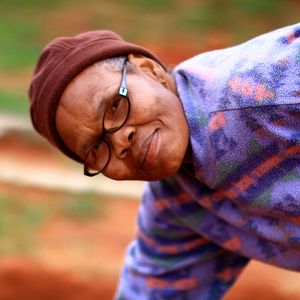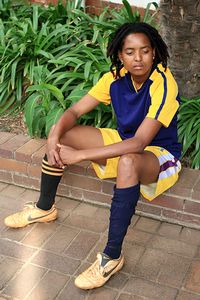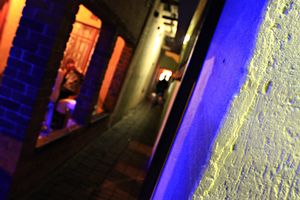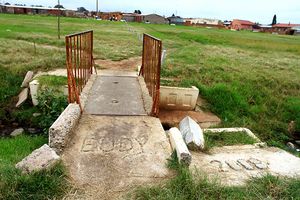Editor's note: This story and video contain mature subject matter. ESPN does not generally identify victims of sexual abuse. These women agreed to tell their stories.
KWA THEMA, South Africa -- In the small, neat home she shares with a husband she describes as a broken man, Mally Simelane talks about her daughter, Eudy, who two years ago was gang-raped and stabbed to death.
[+] Enlarge Joel and Jesse Edwards for E:60Eudy Simelane's mother, Mally, at her grave.
Joel and Jesse Edwards for E:60Eudy Simelane's mother, Mally, at her grave.
"These children are ours," she says, her hands folded across her kitchen table. "The gays and lesbians. I mean, we must accept our children. What they like, it's up to them. We are not God to stop them."
But there are those who are trying to stop them. And to punish them. To scare them. To change them. To "correct" them.
At the time of her murder, Eudy Simelane was almost a decade removed from her career on the South African women's national soccer team. But at 31, she had become a well-respected youth coach, a passionate ambassador for the game she loved. Everyone knew she was gay.
At Eudy's grave -- not far from the creek where her tormentors dumped her mutilated corpse -- Mally says, "I look at her picture. Then pray. Cry. Talk to her. Telling her, 'I miss you.'"
The rationale?
For an act of such violence and malice, it's called something so clinical: "corrective rape."
"The phenomenon of corrective rape is based on the mistaken belief that through the violent act of rape, you can alter someone's orientation, you can alter their identity," says Jody Kollapen, the former chairman of the South African Human Rights Commission, a governmental organization. "The rationale would be that a woman who chooses to be lesbian has surely not had a relationship with a man, and therefore, if she has a relationship with a man, even if it's a violent, forced one, that will surely convince her that the lifestyle she chose is inappropriate."
[+] Enlarge Joel and Jesse Edwards for E:60Eudy Simelane's grave in the township of Kwa Thema.
Joel and Jesse Edwards for E:60Eudy Simelane's grave in the township of Kwa Thema.
Sometimes, as in the case of Eudy Simelane, the perpetrators of corrective rape are interested less in changing their victims than in eradicating them and sending a message to other South African lesbians, who, recent studies show, live in a heightened state of fear -- with good reason.
In the country with the most reported rapes per capita in the world, where it is estimated that nearly half of all women will be raped, so-called corrective rape represents only a fraction of the sexual assaults committed. The exact numbers are impossible to determine -- in part because South Africa has no hate-crime laws that would require authorities to classify corrective rapes separately from other rapes -- but, according to the Human Rights Commission, it is a growing phenomenon. The anecdotal evidence is overwhelming; for instance, the Triangle Project, a gay and lesbian advocacy organization, says it is dealing with 10 new cases of corrective rape every week in Cape Town alone.
A disproportionate number of female athletes have been victims, if only because more are openly gay as Simelane was. On paper, South Africa is among the world's most progressive countries; its constitution emphasizes the rights of the individual, and gay marriage is legal. But South Africa's constitutional aspirations run up hard against certain realities. Before his election, President Jacob Zuma was tried for raping (not corrective rape) an 18-year-old family acquaintance. He was acquitted, but his attitudes about gay marriage -- which he has condemned -- and gays and lesbians in general reflect the prejudices of many of his constituents.
"When I was growing up, [a homosexual] would not have stood in front of me," Zuma said. "I would knock him out."
The rape and murder of Simelane brought the issue of corrective rape to the nation's attention, however briefly, but the situation for lesbians has not improved. On the contrary, it seems to be deteriorating. Talk to men in the impoverished townships, and you see why. Homophobia is rampant. Violence against lesbians is encouraged. And victims say even the police treat them as nuisances and mock them.
Corrective rape is primarily an issue in South Africa's predominantly black townships. Although there are no statistics to show that the majority of victims are black lesbians, the Triangle Project says that 86 percent of black lesbians in the Western Cape live in fear of sexual assault, as opposed to 44 percent of white lesbians.
Mvuleni Fana
Eleven years ago, when she was 16, Mvuleni Fana was walking down a small side street in Daveyton, a township outside Johannesburg, a few hundred yards from the soccer stadium where she played for her local girls team.
[+] Enlarge Joel and Jesse Edwards for E:60Mvuleni Fana no longer plays soccer. She was raped in a stadium after soccer practice when she was 16.
Joel and Jesse Edwards for E:60Mvuleni Fana no longer plays soccer. She was raped in a stadium after soccer practice when she was 16.
Then, Fana remembers, four young men -- she knew them from the soccer fields -- attacked her, knocking her down, dragging her to the stadium.
"I remember some of the things," Fana says now. "I don't remember clearly, but I remember when they took my clothes off."
Fana was raped, beaten, and left battered and unconscious at the stadium. She woke up in a hospital. Her assailants, she says, had taunted her about her sexual orientation.
"You could hear in their voices that I disgust them," she says. "They wanted to teach me a lesson. They wanted to show me who's the man. They wanted me to stop being a lesbian."
When Fana went with her aunt to the police to report the attack, she says she was again taunted: "They say, 'She deserve everything. How can she pretend to be a guy. Why, she's a girl. There's no such thing as gay. A woman is a woman, and a man is a man.'"
Fana says that after the attack, she could never bring herself to play soccer again.
Prejudice still exists
South Africa's mostly peaceful transition from minority white control to democracy in the early 1990s was a triumph of domestic diplomacy. Averting civil war was a modern miracle. But South Africa remains a dangerous place, and the legacy of apartheid is a legacy of violence. Corrective rape, which is primarily a black-on-black crime in South Africa, cannot be blamed entirely on apartheid; it is part of the equation, however.
"The two factors that contribute most substantially to this phenomenon is one, the issue of prejudice and the prejudice that comes from living in a society that is based on a system that puts human beings in separate categories," Kollapen says. "And I think a second factor is that we're a violent society. South Africans have always resorted to the use of violence to resolve their problems. So the combination of prejudice and a propensity toward violence then sees quite a disastrous outcome. And in the context of gays and lesbians, it's a serious problem."
The situation is made more problematic by the difficulty of prosecuting alleged rapists in South Africa. Rape often is difficult to prove, for a variety of reasons, but South Africa's laws, more than those of most nations, vigilantly protect the rights of the accused, which is unsurprising in a country in which most people were denied their rights for so long. This vigilance has resulted in extremely low conviction rates. It is estimated that between 4 and 11 percent of those tried for rape are convicted. When you consider that only a fraction of the rapes committed are reported and only some of those reported rapes result in arrests and only some of those who are arrested are tried, you can see that the odds favor the rapist and not the victim.
"We have a culture of letting a guilty man free rather than putting an innocent man in prison," says Col. Vishnu Naidoo, the chief spokesman for the South African Police Service. "And in order to put a guilty man in prison, the evidence has to be overwhelming."
Naidoo says there was "one incident [Simelane] that generated a lot of media interest where a lady was raped."
"She was raped because she basically exposed a personal status in terms of lesbianism," he said. "But I think this must not actually be perceived to be a problem that's out of control, that's a growing problem as such."
Tumi Mkhuma
[+] Enlarge Joel and Jesse Edwards for E:60Tumi Mkhuma, a corrective rape survivor from Katlehong, now plays for an all-lesbian soccer team.
Joel and Jesse Edwards for E:60Tumi Mkhuma, a corrective rape survivor from Katlehong, now plays for an all-lesbian soccer team.
Fifteen months ago, Tumi Mkhuma was out for the night with some friends in Katlehong, the sprawling, crime-ridden township where she lives. Openly gay, she played striker for a local women's soccer team.
With the music cranked up in the bar where she had been drinking, she says no one could hear her scream when a man grabbed her and dragged her to an adjacent alley.
"The guy was beating me with a crushed bottle," she says, "and then I couldn't fight by myself because he is stronger than me. He started to hit me seriously. He said to me that he will prove a point that I'm a woman. And woman cannot date another woman. I'm not a man. I'm a woman. He will show me that day that I'm a woman."
It wasn't until several weeks later, when she took a pregnancy test, that Mkhuma realized she had, in fact, been raped.
"He raped me when I was collapsed," she says. Mkhuma had an abortion.
"I was scared to go to the police station because I was scared to die," she says. "He told me that he was going to shoot me, hunt me, he knows where I stay."
Ultimately, Mkhuma did file a police report, but her alleged attacker remains at large, even though she says she has since seen him in her neighborhood.
A perceived threat
Homophobia, of course, exists everywhere. In South Africa, it might be called the prevailing attitude.
[+] Enlarge Joel and Jesse Edwards for E:60The pub in Katlehong where Mkhuma was attacked.
Joel and Jesse Edwards for E:60The pub in Katlehong where Mkhuma was attacked.
"People often use culture and argue that it's un-African to be gay and lesbian," Kollapen says, "that it militates against everything that's African. Therefore, gay and lesbian people are seen as a threat to the existence or the continuation of a particular culture."
As perceived threats, gays and lesbians are often dehumanized.
"If I walk with my partner, my girlfriend," Mkhuma says, "the very same people from where I stay, boys, they will say things, they will say, 'Please don't walk like a guy because the guy proved to you that you are a woman, you know.' They would laugh. They make that as a joke."
Eudy Simelane
Of the four men who were tried on charges of raping and murdering Eudy Simelane, one was sentenced to life in prison, another received a 32-year sentence and the other two were acquitted.
[+] Enlarge Joel and Jesse Edwards for E:60A memorial to Eudy Simelane where her mutilated corpse was found dumped in a creek.
Joel and Jesse Edwards for E:60A memorial to Eudy Simelane where her mutilated corpse was found dumped in a creek.
Mally Simelane says that in the two years since her daughter's death, two other lesbians in her neighborhood have been murdered.
Of the four men Fana says attacked her, two were tried and convicted and are serving 27-year sentences. The other two have not been arrested.
She says that even now, 11 years later, she is not the person she was before she was raped.
"It changed me from a jolly person," she says. "It made me an animal to myself. I used to think I was dirty and everything. I didn't deserve to be alive. I used to blame myself."
But Fana doesn't blame herself anymore. She sometimes wears a blue shirt that, on its back, reads, "I'm Lesbian and Proud."
"It's sending a message," she says, "that's saying no matter how much pain you put me through, no matter how much things you can do to me, you'll never change my sexuality."
Unlike Fana, Mkhuma still plays soccer -- on an all-lesbian team that hopes to play at the Gay Games this year in Cologne, Germany. She is hopeful about her future.
"I'm a survivor at the end of the day," Mkhuma says. "Other lesbians have been killed. Raped and been killed. They never get a chance to be alive again."
She is hopeful, too, that, in some way, the man who raped her will be punished. "He will get what he deserves," she says. "Not from me, not from anyone, maybe from God or whoever. But not from me."
Jeremy Schaap is a reporter for "E:60." Beein Gim is a producer for "E:60."
Joel and Jesse Edwards for E:60Members of a soccer team for Luleki Sizwe, a project in Nyanga that supports lesbians.
 Among the other organizations involved in this issue:
Among the other organizations involved in this issue: